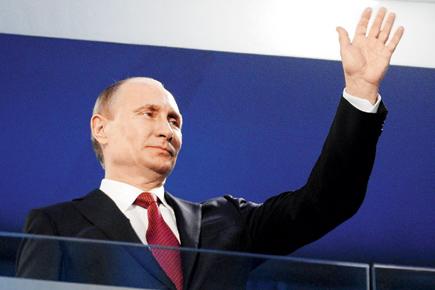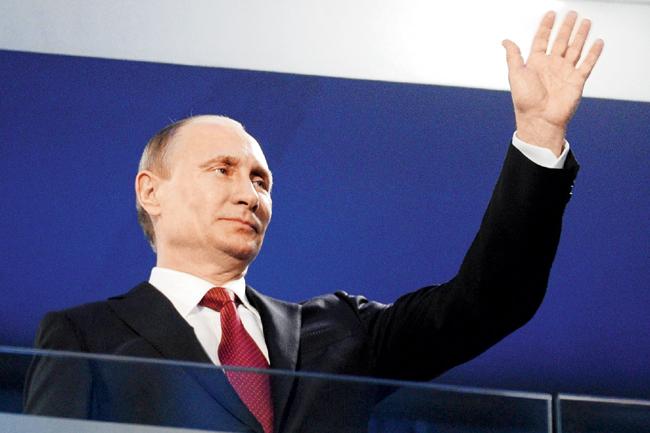Vladimir Putin has given us an important lesson in world politics


ADVERTISEMENT
Vladimir Putin has given us an important lesson in world politics. He has reminded us as to just how it is a run-through ruthless pursuit of self-interest. Over time, hegemons like the US or, before it, Great Britain, learn to disguise it and convince us that what they are doing is actually good for us. But at the end of the day, it is about yourself and your interests.

Power play: For long, Russia’s President Vladimir Putin played a waiting game by going along with the Bush administration’s policies in Iraq and Afghanistan, even though the latter meant the expansion of NATO’s role in Central Asia
But it is not just about ruthlessness or focused self-interest, neither is it about force. It is also about the ability to recognise an opportunity and above all, it is about timing. For some time now the Russians have been under pressure from the US and its European allies. As its population and economy atrophied, the West relentlessly pushed eastward.
First, the erstwhile eastern Europe was incorporated into the NATO alliance. Then, in the shadow of 9/11, as the US flexed its muscle across the world, invaded Afghanistan and Iran, Bulgaria, Slovakia, Slovenia, Romania, Estonia, Lithuania and Latvia were admitted into NATO. The admission of the Baltic Republics was particularly alarming since NATO now came onto the very borders of Russia. The Bush administration also sought to roll back the Anti Ballistic Missile treaty, and sought to place elements of the American missile defence system in countries like Poland and the erstwhile Czechoslovakia, raising concerns in Russia that the US would undermine its strategic deterrent capabilities.
The Russians sought to remain in the game by using their gas supplies as a lever to moderate European behaviour, but the pressure came through multiple means, not in the least the colour revolutions, notably the Orange Revolution in Ukraine in 2004 and the Rose Revolution in Georgia of 2003 which brought pro-western governments to power in those countries. You can be sure that in both events, the United States would have played a clandestine role. It would be against its grain to not do so.
Shorn of all the verbiage about democracy and all that, the US is the global hegemon who pursues its self-interest ruthlessly. When it looks at the geopolitical map of the world, it sees two major challenges — first, Russia, with its vast expanse, resources and huge nuclear arsenal, and second, a rising China whose military capabilities may be limited today, but they are growing rapidly, along with its economy. As far as the US is concerned, they are both potential adversaries, though the nature of the US relationship with them is very different. There is little trade or technology interaction between Russia and the US, while the US and China are deeply involved with each other as trading partners and in addition, China owns more than $ 1 trillion of US treasury bonds. China benchmarks itself against the US and sees it as a rival, though as of now the Americans are vastly superior in economic and military terms.
As for Russia, the effort has been to try and stabilise its situation in the wake of the collapse of the Soviet Union. The US and the West have maintained a constant pressure to ensure that Russia does not again pose the kind of threat that the erstwhile Soviet Union did. The NATO expansion, colour revolutions and no doubt clandestine efforts within have been aimed at ‘democratising’ Russia. For long Mr Putin like the Chinese, played a waiting game. He went along with the Bush administration’s policies in Iraq and Afghanistan, even though the latter meant the expansion of NATO’s role to its near abroad in Central Asia. Indeed, by facilitating the Northern Distribution Network, Russia has been helping pull Washington DC’s Afghan chestnuts out of the fire. Arguably, Russian diplomacy in Syria saved the West from undertaking a potentially disastrous course. But ever since the US stumbled, first in Iraq and then in Afghanistan, both China and Russia have been selectively challenging the US. Both are old powers who have a sound grasp of realpolitik. They have challenged the US only at the periphery of its own power-East China Sea, or in Georgia in 2008 and now Ukraine. And they have done so where they feel that their core interests are at stake. Putin has, of course, been helped by the fact that the Europeans simply lack the will or the wherewithal to challenge the Russians.
And American interests there are peripheral, especially when viewed from the prism of an administration which seems determined to avoid any new foreign entanglement.
The US would be foolish to deepen the new Cold War atmosphere by trying to isolate Russia. As for China, that option is simply not open to them any more. The reason is that the Americans need cooperation from Moscow to deal with Syria, Iran and Afghanistan. They ought to be able to see Russia for what it is — an essentially defensive power, which can actually be helpful, if not needlessly provoked. That, of course, would not quite be the assessment of the real challenge— China.
The writer is a Distinguished Fellow, Observer Research Foundation, New Delhi
 Subscribe today by clicking the link and stay updated with the latest news!" Click here!
Subscribe today by clicking the link and stay updated with the latest news!" Click here!







